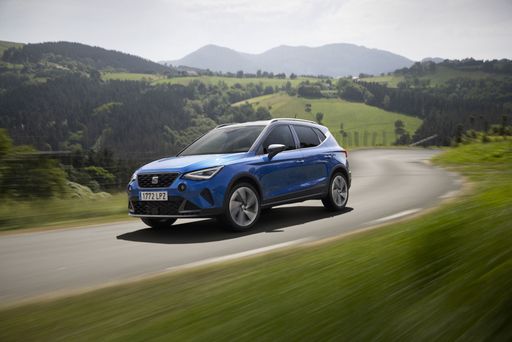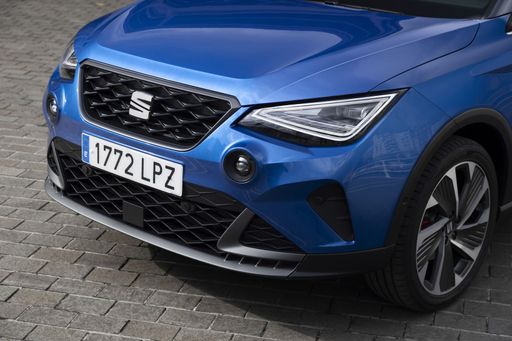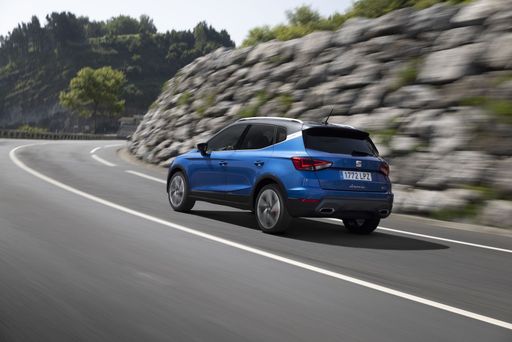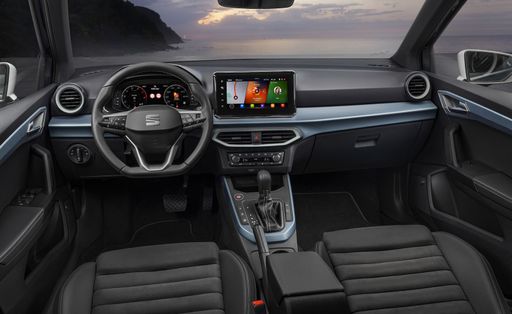SEAT Arona VS VW Transporter Transporter – Specs, Efficiency & Price Comparison
Which model is the better choice – the SEAT Arona or the VW Transporter Transporter? We compare performance (150 HP vs 286 HP), boot capacity (400 L vs ), efficiency (5.40 L vs 21.90 kWh7.10 L), and of course, the price (18400 £ vs 37500 £).
Find out now which car fits your needs better!
The SEAT Arona (SUV) is powered by a Petrol engine and comes with a Manuel or Automatic transmission. In comparison, the VW Transporter Transporter (Cargo Van) features a Diesel, Plugin Hybrid or Electric engine and a Manuel or Automatic gearbox.
When it comes to boot capacity, the SEAT Arona offers 400 L, while the VW Transporter Transporter provides – depending on what matters most to you. If you’re looking for more power, you’ll need to decide whether the 150 HP of the SEAT Arona or the 286 HP of the VW Transporter Transporter suits your needs better.
There are also differences in efficiency: 5.40 L vs 21.90 kWh7.10 L. In terms of price, the SEAT Arona starts at 18400 £, while the VW Transporter Transporter is available from 37500 £.
Compare all the key specs now and find out which model fits your lifestyle best!
SEAT Arona
The SEAT Arona is a stylish compact SUV that blends urban agility with a robust design, making it an ideal choice for city dwellers and adventure seekers alike. Inside, it offers a well-crafted interior with modern technology and connectivity features that enhance the driving experience. With its efficient engine options and responsive handling, the Arona provides a dynamic ride while maintaining impressive fuel efficiency.
details @ seat-mediacenter.de
@ seat-mediacenter.de
 @ seat-mediacenter.de
@ seat-mediacenter.de
 @ seat-mediacenter.de
@ seat-mediacenter.de
 @ seat-mediacenter.de
@ seat-mediacenter.de
VW Transporter Transporter
The VW Transporter, a versatile favourite among commercial vehicles, combines practicality with modern design. Its spacious interior offers ample room for both passengers and cargo, making it a reliable choice for businesses and families alike. The vehicle's strong build and advanced technology ensure a smooth and efficient driving experience in various conditions.
details

|
|
|
|
|
Costs and Consumption |
|
|---|---|
|
Price
18400 - 28900 £
|
Price
37500 - 60800 £
|
|
Consumption L/100km
5.4 - 5.6 L
|
Consumption L/100km
7.1 - 8.4 L
|
|
Consumption kWh/100km
-
|
Consumption kWh/100km
21.9 - 24.4 kWh
|
|
Electric Range
-
|
Electric Range
56 - 331 km
|
|
Battery Capacity
-
|
Battery Capacity
11.8 - 63.8 kWh
|
|
co2
122 - 128 g/km
|
co2
0 - 220 g/km
|
|
Fuel tank capacity
40 L
|
Fuel tank capacity
55 L
|
Dimensions and Body |
|
|---|---|
|
Body Type
SUV
|
Body Type
Cargo Van
|
|
Seats
5
|
Seats
2 - 5
|
|
Doors
5
|
Doors
4 - 5
|
|
Curb weight
1188 - 1268 kg
|
Curb weight
1872 - 2462 kg
|
|
Trunk capacity
400 L
|
Trunk capacity
-
|
|
Length
4153 mm
|
Length
5050 - 5450 mm
|
|
Width
1780 mm
|
Width
2032 mm
|
|
Height
1537 mm
|
Height
1966 - 1985 mm
|
|
Payload
502 - 522 kg
|
Payload
755 - 1259 kg
|
Engine and Performance |
|
|---|---|
|
Engine Type
Petrol
|
Engine Type
Diesel, Plugin Hybrid, Electric
|
|
Transmission
Manuel, Automatic
|
Transmission
Manuel, Automatic
|
|
Transmission Detail
Manual Gearbox, Dual-Clutch Automatic
|
Transmission Detail
Manual Gearbox, Automatic Gearbox
|
|
Drive Type
Front-Wheel Drive
|
Drive Type
Front-Wheel Drive, All-Wheel Drive, Rear-Wheel Drive
|
|
Power HP
95 - 150 HP
|
Power HP
110 - 286 HP
|
|
Acceleration 0-100km/h
8.4 - 11.3 s
|
Acceleration 0-100km/h
7.4 - 16.9 s
|
|
Max Speed
182 - 210 km/h
|
Max Speed
112 - 150 km/h
|
|
Torque
175 - 250 Nm
|
Torque
310 - 415 Nm
|
|
Number of Cylinders
3 - 4
|
Number of Cylinders
4
|
|
Power kW
70 - 110 kW
|
Power kW
81 - 210 kW
|
|
Engine capacity
999 - 1498 cm3
|
Engine capacity
1996 - 2488 cm3
|
General |
|
|---|---|
|
Model Year
2024 - 2025
|
Model Year
2025
|
|
CO2 Efficiency Class
D
|
CO2 Efficiency Class
G, A
|
|
Brand
SEAT
|
Brand
VW
|
SEAT Arona
Discovering the SEAT Arona: A Perfect Urban SUV
The SEAT Arona has consistently positioned itself as an ideal choice for those seeking a versatile and dynamic urban SUV. Packed with innovative features and robust performance, the Arona combines sleek design with practicality. The 2024 model offers compelling options and upgrades, ensuring it remains a strong contender in the B-SUV segment.
Performance and Efficiency: Engineered to Excel
The SEAT Arona is equipped with a range of efficient and powerful petrol engines, varying from 95 PS to 150 PS, covering a spectrum of driving preferences. The 1.0 TSI engines are expertly engineered to deliver both nimble city manoeuvring and efficient long-distance cruising. Fuel consumption figures range between 5.4 to 5.6 L/100km, making the Arona an economically sound choice, balancing spirited performance with fuel efficiency.
Technology: Innovation at its Core
Innovation is a focal point in the Arona's technological offerings. The integration of a digital cockpit, alongside an intuitive infotainment system, provides drivers with seamless connectivity and ease of use. Smart technology includes wireless charging, adaptive cruise control, and parking assistance, ensuring every drive is convenient and connected.
Design and Comfort: Stylish and Spacious
The Arona's design continues to be its hallmark, boasting a bold and dynamic style that stands out on city streets. The exterior's sharp lines and contemporary aesthetics are matched by a comfortable and spacious interior, making the Arona a desirable choice for urban dwellers. With a boot capacity of 400 L, it also offers commendable practicality for everyday and getaway needs alike.
Safety First: Advanced Safety Features
Safety remains a priority with the SEAT Arona. Equipped with a suite of advanced safety technologies, including lane assist, emergency braking, and rear cross-traffic alert, the Arona provides peace of mind. Its robust build and comprehensive safety system ensure protection for all occupants, aligning with modern safety expectations.
Customisation and Range: Tailored to Your Taste
The Arona's wide range of trim options, including FR, FR Anniversary Edition, Style, and Xperience, allow for a highly customisable SUV, catering to diverse stylistic preferences and functional needs. Whether opting for manual or the smooth automatic DSG (7-Gang) transmission, SEAT offers flexibility in creating the ideal driving experience.
Conclusion: A High Achiever in its Class
The SEAT Arona stands as a testament to intelligent design coupled with innovative technology. Its modern features, commendable performance, and cutting-edge design make it an exceptional choice within the urban SUV marketplace. The Arona continues to demonstrate SEAT's commitment to providing a sophisticated and practical vehicle, ensuring it remains a popular choice among discerning drivers.
VW Transporter Transporter
Revolutionizing Utility: The VW Transporter T7
The latest iteration of the VW Transporter, known widely as the Transporter T7, marks a significant evolution in utility vehicle design and functionality. As a mainstay in the VW lineup, the Transporter T7 comes with a plethora of options, ensuring that it meets a variety of professional and personal needs.
Diverse Models to Fit Every Need
For 2025, the VW Transporter T7 is available in multiple configurations, ranging from efficient diesel engines to innovative hybrid systems. The conventional models are powered by a 2.0 TDI diesel engine, offering three power outputs: 110 HP, 150 HP, and a vigorous 204 HP. For those seeking a more sustainable option, the 2.5 eHybrid model provides a combined power output of 233 HP with an electric range of 56 km, thanks to its 11.8 kWh battery.
Innovative Technical Aspects
Underpinning the technical innovations of the Transporter T7 is VW's dedication to cutting-edge engineering. The diesel engines provide torque ranging from 310 Nm up to 390 Nm, ensuring robust performance across the lineup. Moreover, the T7 offers configurations with either manual or automatic gearboxes, catering to different driving preferences.
The availability of front-wheel drive and the 4MOTION all-wheel-drive system across the range enhances versatility, allowing the Transporter T7 to tackle various terrains with ease. With body lengths extending to 5450 mm and a payload capacity of up to 1259 kg, the Transporter T7 stands as a paragon of practicality for transporting goods or accommodating passengers.
Comfort and Design Revolution
Beyond performance, the VW Transporter T7 has been designed with driver comfort and ergonomic efficiency in mind. The cabins offer ample seating configurations, supporting both two-seat and five-seat layouts. The inclusion of modern conveniences elevates the driving experience, making long hauls more manageable and stress-free.
The exterior dimensions, with a width of 2032 mm and a height up to 1969 mm, marry the classic robust design with a contemporary touch, making the Transporter T7 a visual centerpiece in any fleet.
Economical and Environmental Impact
Economic efficiency is another critical aspect of the VW Transporter T7's design philosophy. With diesel fuel tank capacities between 55 and 63 liters, and an emphasis on improving mileage with each engine variant, operational costs are kept at a minimum. Additionally, the eHybrid model not only offers environmental benefits but also presents substantial savings on fuel through its electric range capability.
Conclusion: The Transporter T7 Legacy Continues
The VW Transporter T7 furthers the legacy of its predecessors by combining practicality, innovation, and eco-friendliness. Whether utilized for business in its cargo van capacity or adapted for personal use with seating comforts, the Transporter T7 is set to remain a critical player in the automotive sector, pushing the boundaries of what a multi-purpose van can achieve.
The prices and data displayed are estimates based on German list prices and may vary by country. This information is not legally binding.
